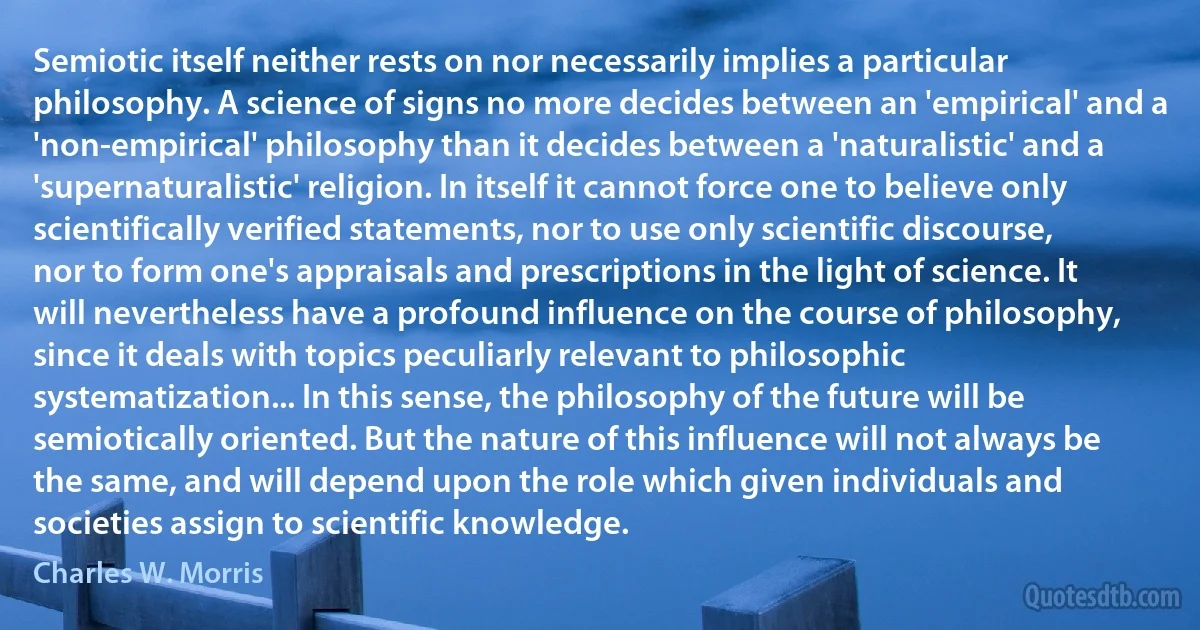
Semiotic itself neither rests on nor necessarily implies a particular philosophy. A science of signs no more decides between an 'empirical' and a 'non-empirical' philosophy than it decides between a 'naturalistic' and a 'supernaturalistic' religion. In itself it cannot force one to believe only scientifically verified statements, nor to use only scientific discourse, nor to form one's appraisals and prescriptions in the light of science. It will nevertheless have a profound influence on the course of philosophy, since it deals with topics peculiarly relevant to philosophic systematization... In this sense, the philosophy of the future will be semiotically oriented. But the nature of this influence will not always be the same, and will depend upon the role which given individuals and societies assign to scientific knowledge.
Charles W. MorrisRelated topics
assign believe course force form future given knowledge light nature nor religion science sense use verifiedRelated quotes
My first encounter with the concept of "information service" came with the reading of The Social Function of Science by Desmond Bernal, first published in 1939-a work that stimulated a whole generation of young scientists to think about the role of science in society, its organisation, its future. In it, he wrote that in every laboratory "there should be someone deputed to watch the whole of current literature for items which might be relevant to the work of the laboratory, and to be able to indicate without loss of time where such items are likely to be found." Such a person "would have to be chosen partly for his comprehensive scientific interests, which need to be much greater than those of the other laboratory workers, and partly for his inclination to systematic thinking." Already I felt that I might be suited to such a role.

Brian Campbell Vickery
There are particular movements in particular epochs in which the Divine Force manifests itself with supreme power shattering all human calculations, making a mock of the prudence of the careful statesman and the scheming politician, falsifying the prognostications of the scientific analyser and advancing with a vehemence and velocity which is obviously the manifestation of a higher than human force. The intellectual man afterwards tries to trace the reasons for the movement and lay bare the forces that made it possible, but at the time he is utterly at fault, his wisdom is falsified at every step and his science serves him not. These are the times when we say God is in the movement, He is its leader and it must fulfil itself however impossible it may be for man to see the means by which it will succeed.

Sri Aurobindo
It should be clear by now that there are people who can, in fact, be reasonably considered experts; that it is rational to rely, within limits, on ex pert opinion; and that it is possible, by exercising relatively simple criteria, to gain insight into whether a particular expert is reliable or not. It is also true that experts, of course, do make mistakes, and that even the agreement of a large majority of experts in a field does not guarantee that they got it right. That's the nature of scientific truth, as we have seen throughout this book: it is tentative, because it is the result of a human endeavor that is limited both by the type and amount of available evidence and by humans' finite mental powers and emotional reactions. But the examples above show how you can, with a little bit of practice, tell science from bunk!

Massimo Pigliucci
The predictions of physical theories for the most part concern situations where initial conditions can be precisely specified. If such initial conditions are not found in nature, they can be arranged. Such arrangements are considerably easier to realize with inanimate than with animate matter, because the properties of animate matter are much more sensitive to being tampered with than inanimate matter. In particular, living tissue in vitro may behave quite differently than in situ. Controlled biological experiments are, of course, possible, but they are more difficult and their scope is more limited than that of physical experiments. For this reason, biology has had to depend to a greater extent than physics on theories of larger speculative scope, in which reasoning by imaginative analogy plays a more important role.

Anatol Rapoport
The King is the symbol of the union, not only of an Empire, but of a society which is held together by a common view of the fundamental nature of man. It is neither the worship of a tribe nor a class. It is a faith, a value placed upon the individual, derived from the Christian religion. The Christian State proclaims human personality to be supreme; the servile State denies this. Every compromise with the infinite value of the human soul leads straight back to savagery and the jungle. Expel this truth of our religion, and what follows? The insolence of dominion, and the cruelty of despotism. Denounce religion as the opium of the people, and you swiftly proceed to denounce political liberty and civil liberty as opium. Freedom of speech goes, tolerance follows, and justice is no more.

Stanley Baldwin
